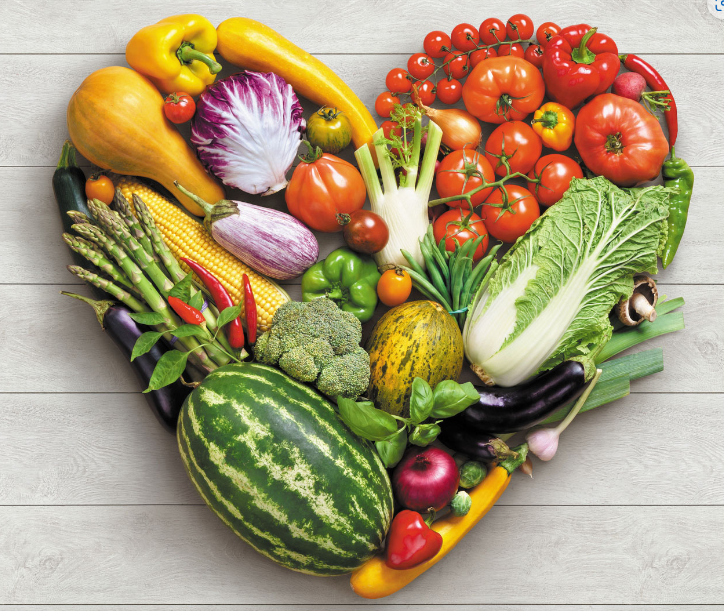
In today’s world, maintaining heart health is more important than ever. With rising concerns about heart disease, many people are looking for ways to improve their cardiovascular health naturally. One of the most effective ways to support a healthy heart is through a balanced, nutrient-rich diet. Enter the vibrant vegetarian diet—a plant-based way of eating that can work wonders for your heart.
Why a Vegetarian Diet is Beneficial for Heart Health Vibrant Vegetarian Plan
A vegetarian diet is rich in fruits, vegetables, legumes, nuts, seeds, and whole grains, all of which are known for their heart-healthy properties. A plant-based diet offers plenty of fiber, antioxidants, and healthy fats that work together to lower cholesterol, reduce inflammation, and maintain healthy blood pressure. Moreover, vegetarians tend to consume fewer processed foods, saturated fats, and unhealthy oils that contribute to heart disease.
Research has consistently shown that people who follow a vegetarian diet have a lower risk of heart disease, hypertension, and stroke. By eliminating meat, particularly red and processed meats, vegetarians tend to consume fewer harmful fats and more foods that are high in heart-protective nutrients.
Vibrant Vegetarian Plan Key Nutrients for a Healthy Heart
Several nutrients are crucial for maintaining cardiovascular health, and a vegetarian diet is full of these heart-loving components:
- Fiber: Found abundantly in fruits, vegetables, and whole grains, fiber helps reduce cholesterol levels and improves blood sugar control, both of which are essential for heart health.
- Omega-3 Fatty Acids: While omega-3s are typically found in fish, plant-based sources such as chia seeds, flaxseeds, and walnuts are excellent alternatives that help reduce inflammation and improve blood vessel function.
- Antioxidants: Fruits like berries, apples, and oranges are packed with antioxidants, which help neutralize free radicals in the body and protect the heart from damage. The compounds in these foods help reduce oxidative stress and improve overall cardiovascular health.
- Magnesium: This vital mineral, found in leafy greens, legumes, and nuts, helps regulate blood pressure and supports proper heart rhythm. Magnesium also works to relax blood vessels and prevent hypertension.
- Potassium: Vegetables like spinach, sweet potatoes, and bananas are rich in potassium, a mineral that helps control blood pressure by balancing out the effects of sodium.
Building a Heart-Healthy Vegetarian Meal Plan
Creating a balanced vegetarian meal plan that supports heart health doesn’t have to be complicated. Below is a sample of a heart-healthy day’s worth of meals.
Breakfast: Start your day with a nutrient-dense breakfast that includes fiber and heart-healthy fats. Consider a bowl of oatmeal made with almond milk and topped with sliced bananas, chia seeds, and a drizzle of maple syrup. This meal provides fiber, antioxidants, and omega-3 fatty acids to fuel your day.
Lunch: For lunch, enjoy a vibrant quinoa salad loaded with roasted vegetables such as bell peppers, tomatoes, and zucchini. Add chickpeas for protein and a sprinkle of pumpkin seeds for healthy fats. Toss it all in an olive oil-based dressing with lemon juice, garlic, and a pinch of turmeric. This colorful salad offers an array of heart-protective nutrients, including fiber, potassium, and magnesium.
Dinner: A comforting vegetable stir-fry with tofu, broccoli, carrots, and snow peas over brown rice makes for a delicious and filling dinner. Add a sauce made from tamari (or low-sodium soy sauce), garlic, ginger, and sesame oil for flavor. This meal is rich in plant-based protein, fiber, and antioxidants that are excellent for heart health.
Snacks: Throughout the day, incorporate healthy snacks such as apple slices with almond butter, roasted almonds, or a handful of dried cranberries. These snacks provide heart-healthy fats, antioxidants, and fiber, helping to regulate cholesterol and blood sugar levels.
Meal Preparation Tips for a Heart-Healthy Vegetarian Diet
Transitioning to a heart-healthy vegetarian diet doesn’t require drastic changes, but there are a few strategies that can help make the shift easier and more enjoyable.
- Plan Ahead: Meal planning is key to sticking with any dietary change. Create a weekly meal plan, grocery list, and batch-cook your meals when possible. Preparing vegetables, grains, and legumes ahead of time will make it easier to throw together quick, heart-healthy meals during the week.
- Use Healthy Fats: Instead of butter or margarine, opt for heart-healthy fats like olive oil, avocado, or nuts. These fats help support healthy cholesterol levels and provide a satisfying richness to dishes.
- Experiment with Plant-Based Proteins: Many plant-based proteins are rich in fiber and antioxidants. Explore options like lentils, beans, tempeh, and seitan. These foods provide ample protein without the saturated fat found in animal products.
- Embrace a Variety of Fruits and Vegetables: To maximize the benefits of a vegetarian heart-healthy diet, consume a diverse range of colorful fruits and vegetables. Different colors indicate different nutrients, so aim for a rainbow of foods on your plate.
- Limit Processed Foods: Although plant-based processed foods like veggie burgers or vegan cheeses can be tasty, they often contain added sugars, unhealthy fats, and preservatives. Focus on whole foods like legumes, whole grains, and fresh vegetables.
Conclusion
A vibrant vegetarian diet is not only a delicious way to eat, but it’s also one of the most effective ways to protect your heart. With an abundance of heart-healthy nutrients and antioxidants, plant-based foods provide the foundation for a diet that promotes cardiovascular well-being. By including a variety of colorful fruits, vegetables, whole grains, legumes, and healthy fats, you’ll be on your way to enjoying a healthier heart and a happier life.





